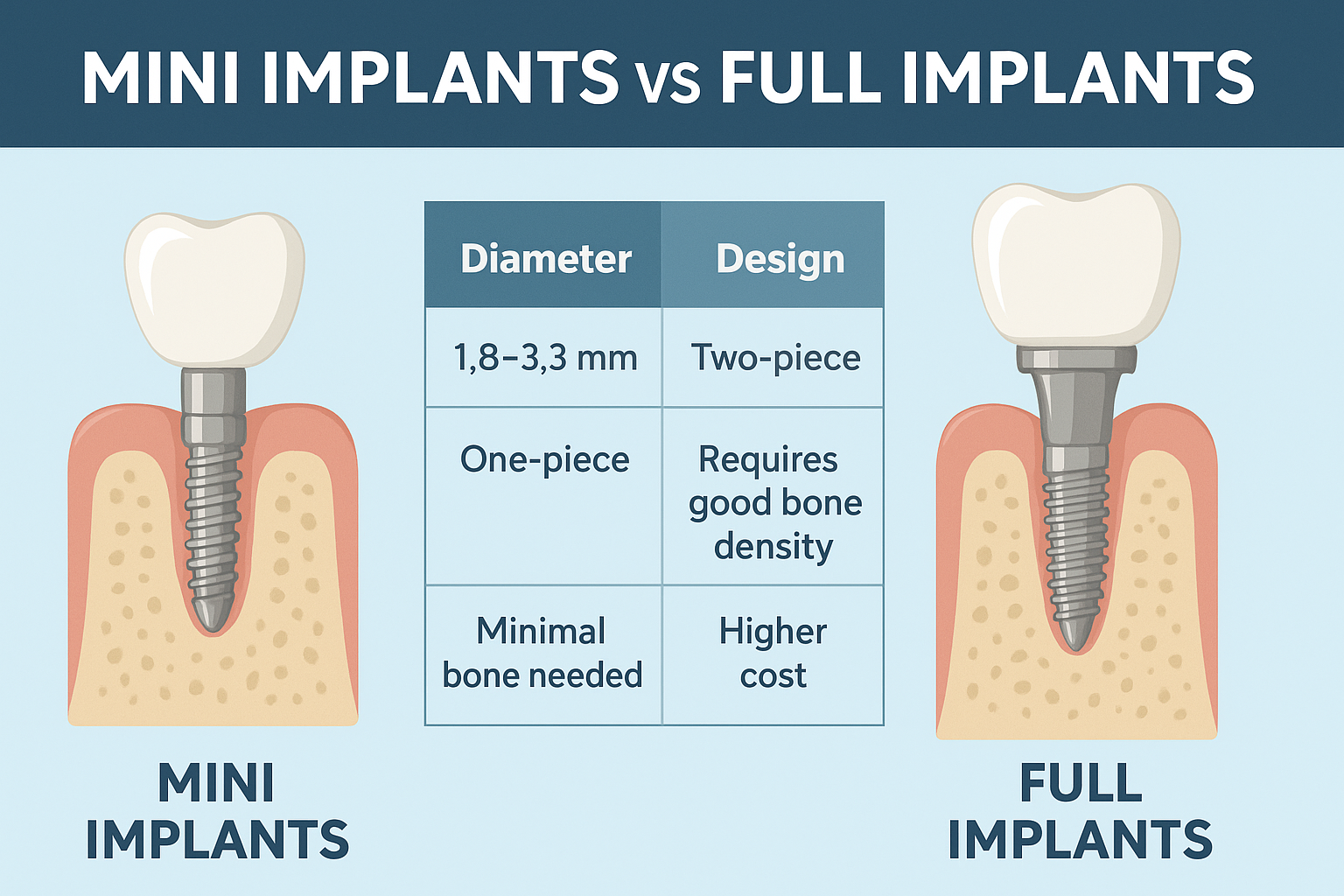
Mini Implants vs Full Implants.
🦷 Introduction: What Are Dental Implants?
Dental implants are one of the most popular solutions for replacing missing teeth. Among the different types available, mini implants and full (standard) implants are often compared due to differences in structure, application, and cost.
In this article, we’ll explore “Mini implants vs full implants” in-depth, covering all relevant nano topics so you don’t need another article on this subject.
🔍 What Are Mini Dental Implants?
- Also known as narrow diameter implants (NDIs)
- Diameter: 1.8 mm to 3.3 mm
- Single-piece design: post and abutment are fused
- Often used for:
- Stabilizing dentures
- Small tooth replacements (e.g., incisors)
- Patients with minimal bone volume
🦷 What Are Full (Standard) Dental Implants?
- Traditional two-piece implant systems
- Diameter: 3.5 mm to 6 mm
- Post (screw) inserted into jawbone + separate abutment and crown
- Often used for:
- Single-tooth replacement
- Bridges and full-arch restorations
- Cases with adequate bone density
📊 Key Differences: Mini Implants vs Full Implants
| Feature | Mini Implants | Full (Standard) Implants |
| Diameter | 1.8–3.3 mm | 3.5–6 mm |
| Parts | One-piece | Two-piece |
| Bone Requirement | Minimal bone needed | Requires good bone density |
| Healing Time | Shorter (often immediate load) | Longer (3–6 months healing) |
| Cost | More affordable | Higher cost |
| Durability | Less durable (not for heavy bite) | Long-lasting, more durable |
| Use Case | Denture stabilization, small teeth | Full tooth replacement |
| Procedure Complexity | Less invasive | Surgical placement required |
| Longevity | 5–10 years (approx.) | 15–25+ years |
💡 When Are Mini Implants Preferred?
- Insufficient bone width for full implant
- Elderly patients who prefer minimally invasive procedures
- Patients with medical conditions contraindicating surgery
- Stabilizing lower dentures
- Temporary or transitional implants
💪 When Are Full Implants Better?
- Long-term single-tooth replacement
- Full arch prosthesis (All-on-4/6)
- Patients with good bone density
- Load-bearing regions like molars
- Better aesthetics and functional strength
🦷 Bone Density & Anatomy Considerations
- Mini implants are suitable when bone grafting is not feasible or not preferred
- Full implants are preferred in:
- Posterior mandible (denser bone, strong support)
- Maxillary anterior (aesthetic zone, needs precision)
- Bone grafting may be needed for full implants in case of trauma, bone loss, or periodontal disease
💰 Cost Comparison: Mini Implants vs Full Implants
| Type | Average Cost (Per Tooth) |
| Mini Implant | ₹15,000–₹30,000 ($200–$400) |
| Full Implant | ₹40,000–₹80,000 ($600–$1,500) |
Note: Costs vary based on city, clinic, material, and additional procedures like sinus lift or grafting.
🧪 Materials Used
- Mini Implants: Usually Titanium alloy, single piece
- Full Implants: Titanium or Zirconia (for metal-free option)
🦷 Durability & Lifespan
- Mini Implants:
- May last 5–10 years
- Higher chance of failure under heavy biting forces
- Full Implants:
- Can last 15–25+ years
- Highly reliable with proper care
🧼 Maintenance & Cleaning
- Both require proper oral hygiene
- Full implants may be easier to clean if designed with individual crowns
- Mini implants under dentures need careful cleaning underneath
⚖️ Pros and Cons Summary
✅ Mini Implants – Pros
- Affordable
- Minimally invasive
- Quick recovery
- No bone grafting usually required
❌ Mini Implants – Cons
- Not ideal for heavy bite forces
- Lower longevity
- Limited applications
✅ Full Implants – Pros
- Stronger and more stable
- Ideal for long-term
- Suitable for all regions
❌ Full Implants – Cons
- Higher cost
- Surgical procedure
- Longer healing time
📝 Conclusion
Both mini implants and full implants serve vital roles in modern dentistry. The right choice depends on your oral health, bone structure, budget, and long-term goals.
For younger individuals and those seeking long-term solutions, full implants are ideal. For elderly patients, limited bone, or denture stabilization, mini implants offer a less invasive, budget-friendly alternative.
Consult your implantologist or prosthodontist to determine what suits you best.
“Looking for quality oral care products? Simply click on the ‘Shop’ menu item to explore our curated selection.”
Related Reads
Bridge vs Implant vs Denture: Which Tooth Replacement Option is Best?
Best Bridge Material for Front Teeth: A Complete Guide for Long-Lasting Smile
How Long Do Dental Bridges Last? Understanding Lifespan, Influencing Factors, and Maintenance Tips
How Long Do Dental Crowns Last? Lifespan, Factors & Care Tips
How Painful Is a Dental Implant? – Understanding the Procedure, Pain Levels, and Recovery
How Long Does It Take to Heal After a Dental Implant?
❓ 10 FAQs (Not Covered in the Article)
- Are mini implants FDA-approved?
Yes, they are approved for specific use cases. - Can I switch from mini to full implant later?
Yes, but it may require surgical removal and bone grafting. - Are mini implants painful?
Usually less discomfort due to smaller size and minimal surgery. - Do full implants always require bone grafting?
Not always, but often in cases of bone loss. - Can diabetics get mini implants?
Yes, if their diabetes is well-controlled. - Is zirconia used for mini implants?
Rarely; mini implants are mostly titanium. - Are mini implants removable?
No, they are fixed but support removable dentures. - How soon can I eat after mini implants?
Often within a day, depending on loading protocol. - Do full implants look better than mini implants?
Yes, especially in front teeth areas. - Can mini implants fail more easily?
Yes, especially in cases of bruxism or poor oral hygiene.
